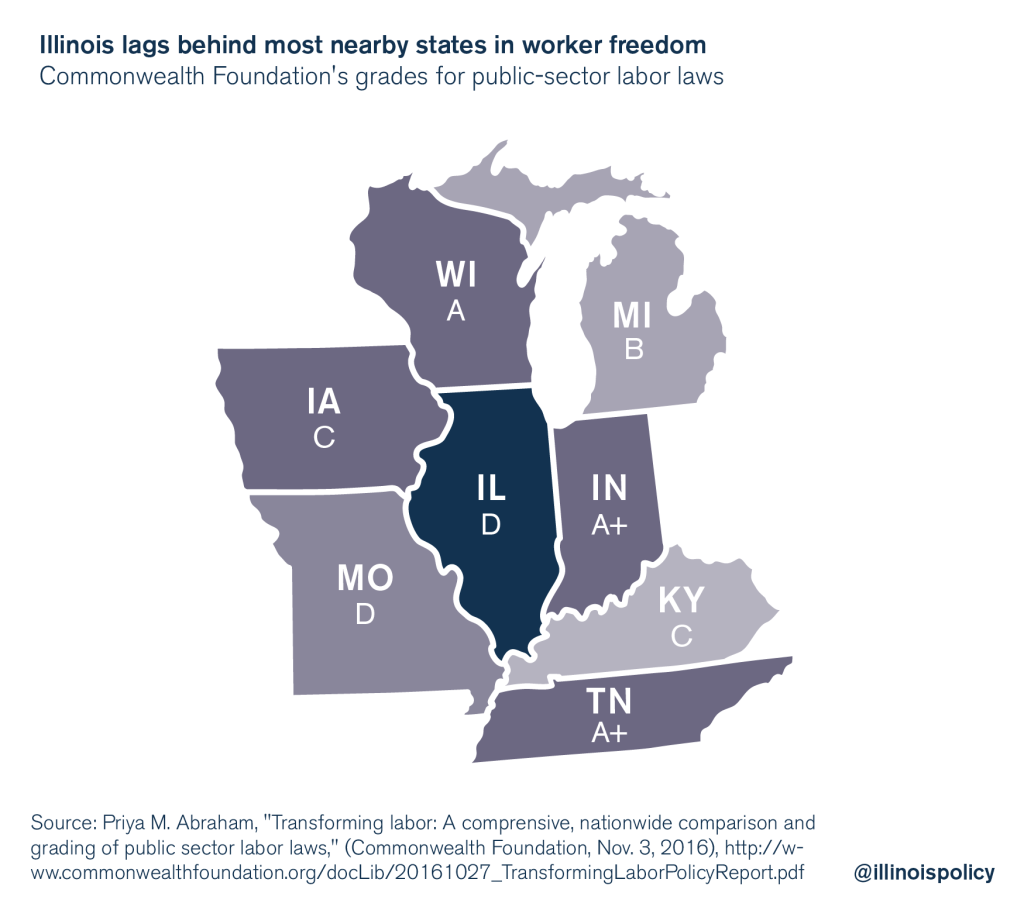Labor reform needed: In Illinois, worker freedom lags behind neighboring states
In a recent study, Illinois received a grade of D for the negative impact its collective bargaining laws have on taxpayers and government workers alike.
A study released Nov. 3 by the Commonwealth Foundation reveals that Illinois’ collective bargaining laws – the laws that regulate the state’s relationship with government-worker unions – lag behind those in other states in providing worker freedom.
The study examined collective bargaining laws in all 50 states, focusing on: 1) provisions that affect taxpayers, such as whether negotiation with government-worker unions is required, and 2) provisions that impact individual workers’ rights, such as Right-to-Work laws. Each state received a grade based on the impact those provisions have on taxpayers and workers.
Illinois’ grade: D.
This ranking is not surprising given the power that union leadership has over its members in Illinois. Once a union has been certified by a group of employees as its exclusive bargaining representative, it is incredibly difficult to decertify that union if employees become dissatisfied. Illinois law provides a process for public-sector workers to decertify their unions, but the process is heavily weighted in favor of the incumbent union.
In both the public and private sectors, few union members today actually voted for the unions that represent them. Nationwide, only 7 percent of private-sector union members actually participated in electing their unions. That number is even lower for government workers, whose unions were organized in the 1960s and 1970s.
Take the Chicago Teachers Union, or CTU. CTU claims to have represented teachers in Chicago for more than 75 years. Newspapers reported that CTU was elected as the sole collective bargaining agent in 1966 with less than 50 percent of the teacher vote. So what Chicagoans have in 2016 is an entrenched union, which was chosen before many of the teachers it represents were even born, and was not even approved by 50 percent of teachers working at the time of the election.
Illinois’ D grade isn’t shocking, but it should be alarming – particularly when Illinois is compared with neighboring states.
Indiana received an A+ for its collective bargaining laws and worker freedom provisions, while Wisconsin received an A. With the exception of Missouri, Illinois is surrounded by states with better labor law ratings.

As documented in the study, the U.S. has seen sweeping labor reforms in the last five years. For example, three of Illinois’ neighbors – Indiana, Michigan and Wisconsin – enacted Right-to-Work laws. And among several reforms passed in Wisconsin in recent years, the state now requires a secret ballot election, conducted by the state’s Employment Relations Commission, to recertify unions on a yearly basis. A single union can no longer maintain an unquestioned, decadeslong hold on employees. Instead, government workers in Wisconsin get to vote on union representation every year.
It’s past time for Illinoisans to see similar reforms. People are leaving Illinois in droves. Illinois has the highest property taxes in the nation and the worst personal income recovery in the Midwest. And the fact that Illinois provides less worker freedom than its neighbors only makes matters worse.
There are numerous reforms the state could pursue that would improve worker freedom. An excellent starting point would be recertification legislation to allow government workers a secret ballot election every one to two years. Government employees such as Chicago Public Schools teachers could then choose which union – if any – should represent them.
Recertification would bring accountability to government unions like CTU. The chance that a union could be decertified would provide an impetus to represent the will of its members – and not solely the will of its leaders.
